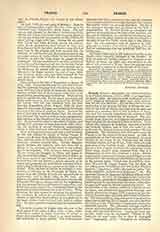

Franck, KASPAR, theologian and controversialist; b. at Ortrand, Saxony, November 2, 1543; d. at Ingolstadt, March 12, 1584. His parents were Lutherans and his early religious instruction filled him with enthusiasm for the new doctrine. His earnest desire for the conversion of his country led him to choose the ministry as his field of labor, and such was his zeal and success as a preacher that Count Ladislaus of Haag, who had but recently introduced the reformed faith into his province, invited him to his court. The premature death, however, of Ladislaus prevented Franck from carrying out the proposed plans of reform. Duke Albert, the successor of Ladislaus, resolved to restore the Catholic religion, and to that end called to his assistance the famous convert and preacher, Martin Eisengrein. His intercourse with Eisengrein soon led Franck to see the errors of the new creed. In 1566, he matriculated at the University of Ingolstadt, devoted himself to the study of the Fathers and the early Christian Church, and on January 25, 1568, made a formal profession of the Catholic Faith. Albert, recognizing him as a man of great usefulness in reclaiming to the Faith many strayed souls, obtained from Pius V a dispensation to have him ordained a priest. Before beginning his missionary labors, he published a work setting forth the reasons and justification of his return to the ancient faith; “Klare vnd Grundtliche vrsachen Warumb M. Caspar Franck Von der Sect, zu der allgemainen Christlichen vnd Romischen Kirchen getreten” (Ingolstadt, 1568); the same in Latin, “Dilucida expositio justissimarum causarum”, etc. His apostolic labors in Haag and Kraiburg were crowned with success. In 1572, he was again in the University of Ingolstadt, pursuing his theological studies, and the following year he woiiclt its rector which office he again held later for several consecutive terms. On the occasion of the General Jubilee in 1575, he set out for Rome, won at Siena the doctorate in theology, and shortly afterwards Gregory XIII conferred on him the title of Prothonotary Apostolic and Comes Lateranensis. His vast erudition, zeal, and power of penetration place him on the long list of learned men who directed the destiny of the University of Ingolstadt during the sixteenth century. His polemical writings manifest earnest and painstaking labor and an intimate familiarity with patristic literature. Among his more important works may be mentioned: “Brevis et Pia Institutio de puro verbo Dei et clara S. Evangelii lute” (Ingolstadt, 1571); “Tractatus de ordinaria, legitima et apostolica vocatione sacerdotum et concionatorum”, etc. (Ingolstadt, 1571); “Casparis Franci de externo, visibili et hierarchico, Ecclesiae Catholic ae sacerdotio”, etc. (Cologne, 1575); “Catalogue hereticorum” (Ingolstadt, 1576); “Explicatio totius historiae Passionis et Mortis Domini”, etc. (Ingolstadt, 1572); “Fundamentum Catholic ae Fidei contra Schrnidelin” (Ingolstadt, 1578).
JOSEPH SCHROEDER

